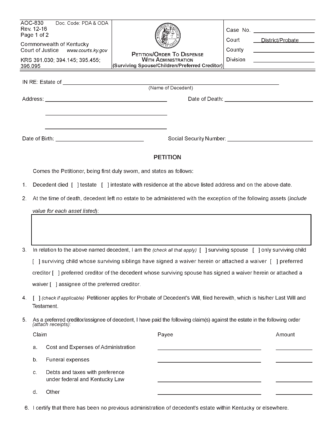

A Kentucky small estate affidavit, called the “Petition to Dispense with Administration,” is a legal document that permits estates to be distributed without probate. The process of administering an estate through court can be a relatively long and costly process. By filing a petition with the district court for the jurisdiction in which the decedent was a resident, the petitioner requests the court to order that the estate be distributed without further court involvement.
Under state law, a surviving spouse is entitled to the first $30,000 of the decedent’s estate, exempt from probate. The petition acts as a legal instrument to distribute a decedent’s entire estate without any court proceeding if it is equal to or less than the exempt spousal amount. The petition can only be filed by the surviving spouse , children, or creditor of the decedent. If there is no surviving spouse, the exempt amount will be distributed between any surviving children.
Note: The Petition to Dispense with Administration is not technically an affidavit.
To bypass estate administration, the petitioner must first ensure that the below requirements have been fulfilled.
The Petition to Dispense with Administration can be completed by the surviving spouse, child, or preferred creditor of the decedent. The document requires the signatures of the surviving spouse and children of the decedent.
The completed petition must be brought to a notary public to be notarized. The notary will need to verify the petitioner’s identity and may require a certified copy of the decedent’s death certificate and a copy of their will.
Once the petition has been completed and notarized, it will need to be filed with the District Court for the county in which the decedent was a resident.
A preferred creditor is an individual who has paid for the decedent’s estate administration, funeral arrangements, debts, taxes, and other expenses deemed admissible by the court.
If the petition is granted, a judge will sign the order (found on the same form). The petitioner will be mailed a certified copy of the order or notification of the petition’s denial. The certified order can be used to collect the decedent’s property and distribute it to the creditors and heirs.